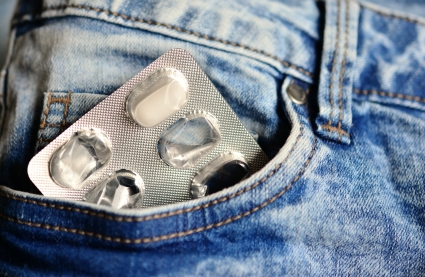Paracetamol is an analgesic (painkiller) and antipyretic (fever reducer) drug commonly used to treat mild to moderate pain and fever. It works by blocking the production of certain chemicals in the body that cause pain and fever.
Paracetamol is available in tablets, capsules, oral liquids, suppositories and other forms. It is often used to treat headaches, muscle pain, joint pain, dental pain and menstrual pain. However, it's important to follow the instructions for use and recommended doses to avoid unwanted side effects.
Why shouldn't I take paracetamol with alcohol ?
Taking paracetamol with alcohol is not recommended, as it may increase the risk of liver damage. Paracetamol is a drug commonly used to relieve pain and fever, but it can be toxic to the liver when taken in large quantities or over a long period of time. Alcohol can also cause liver damage, and the combination of alcohol and paracetamol can further increase the risk of liver damage.
It's important to follow your doctor's instructions and read drug labels carefully before taking any medication. If you take paracetamol and drink alcohol, it is important to drink alcohol in moderation and not to exceed the recommended doses of paracetamol. If you have any doubts or questions, please consult your doctor or pharmacist.
What are the risks of paracetamol poisoning ?
Paracetamol is generally well tolerated and is considered a safe drug when used in accordance with a doctor's instructions or the label. However, an overdose of paracetamol can lead to intoxication, which can be serious and even fatal if not treated promptly.
Symptoms of paracetamol poisoning can include abdominal pain, nausea, vomiting, loss of appetite and dark urine. If you experience any of these symptoms after taking paracetamol, it's important to seek immediate medical attention or call your nearest poison control center.
To avoid paracetamol poisoning, it's important to follow your doctor's instructions and read drug labels carefully before taking any medication. Never take higher doses of paracetamol than recommended, and do not take paracetamol for a prolonged period without talking to your doctor. If you have any doubts or questions about using paracetamol, please consult your doctor or pharmacist.
What's the difference between paracetamol and aspirin ?
Paracetamol and aspirin are both analgesics, i.e. drugs used to relieve pain. However, they act in different ways and can be used in different situations.
Paracetamol is an analgesic that works by blocking the production of prostaglandins, which are chemicals that can cause pain and inflammation in the body. Paracetamol is effective in relieving mild to moderate pain, such as headaches, menstrual pain and muscle aches. It is also used to reduce fever. Paracetamol is generally well tolerated and is considered a safe medication when used in accordance with a doctor's instructions or label directions.
Aspirin, also known as acetylsalicylic acid, is an analgesic that acts by blocking the action of the enzyme cyclooxygenase (COX), which is involved in the production of prostaglandins. By blocking this enzyme, aspirin can reduce pain and inflammation. Aspirin is used to relieve mild to moderate pain, such as headaches and muscle aches, but it can also be used to reduce fever and as an anti-inflammatory. Aspirin can cause side effects such as stomach upset and nosebleeds, and is not recommended for people with ulcers or certain other medical conditions.
It's important to follow your doctor's instructions and read drug labels carefully before taking any medication. If you have any doubts or questions about using aspirin or paracetamol, please consult your doctor or pharmacist.
Can I take aspirin with alcohol ?
Taking aspirin with alcohol is generally not recommended. Alcohol can aggravate aspirin side effects, such as stomach upset and nosebleeds, and can also increase the risk of bleeding. In addition, alcohol can diminish aspirin's effectiveness by reducing its ability to reduce pain and inflammation.
It's important to follow your doctor's instructions and read drug labels carefully before taking your medication. If you take aspirin and drink alcohol, it is important to drink alcohol in moderation and not to exceed the recommended doses of aspirin. If you have any doubts or questions, please consult your doctor or pharmacist.
How can I reduce the symptoms of a hangover ?

Here are a few tips to relieve the symptoms of an alcoholic binge :
- Drink plenty of water. Alcohol can dehydrate your body, so it's important to drink water to rehydrate and avoid a hangover.
- Eat nutritious food. Alcohol can disrupt your metabolism and weaken your immune system, so it's important to eat nourishing foods to help you feel better.
- Take a nap. If you're feeling drowsy, taking a nap for a few hours can help you feel better.
- Take an over-the-counter medication. Over-the-counter medications such as ibuprofen or paracetamol can help relieve the headaches and pain associated with binge drinking.
- Avoid alcohol. It's important to let a certain amount of time pass before drinking alcohol again to avoid finding yourself in the same situation.
It's important to note that these tips are not a miracle solution and do not replace medical treatment. If you experience severe or persistent symptoms, we recommend that you consult a doctor.
Is milk an effective remedy for reducing the effects of alcohol ?
There is no conclusive scientific evidence that drinking milk can reduce the effects of alcohol. However, some believe that milk may help reduce hangover symptoms due to its moisturizing and nourishing properties.
Milk is a source of protein and vitamins, which can help nourish your body and make you feel better. What's more, milk contains calcium, which can help reduce stomach cramps and protect your digestive system from the effects of alcohol.
While drinking milk can benefit your body in a number of ways, it's no substitute for medical treatment for severe or persistent alcohol-related symptoms. If you have severe or persistent symptoms, we recommend that you consult a doctor.
Updated on 18 June 2023 at 19:17







